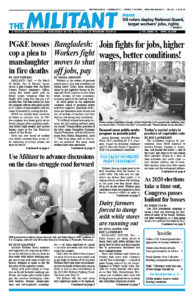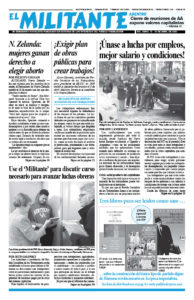April 24, 1995
PHILADELPHIA — The “no money” chorus led by the Southeastern Pennsylvania Transit Authority and Mayor Ed Rendell changed its tune here April 10, as management was forced to reach a settlement in a two-week strike by 5,200 members of Transport Workers Union Local 234.
SEPTA came up with additional funding for wages, pensions and benefits after the TWU extended its strike from city to suburban lines. Despite an injunction limiting to four the number of pickets, hundreds of strikers turned out for early-morning rallies at suburban stations.
The determination of the TWU members made it clear that the politicians’ “crazy-to-strike-in-these-hard-times” anti-labor campaign was becoming counterproductive. Many workers expressed admiration for actions by TWU members aimed at making their strike more effective.
April 24, 1970
April 15 — Hundreds of thousands marched and rallied today in major cities throughout the nation in a full day of mass actions against the war in Vietnam. More than 100,000 rallied in Boston, the biggest demonstration in the country, and in New York City, some 40,000 turned out. The message to President Nixon again resounded: Get all U.S. troops out of Vietnam now.
As part of the nationwide strike sponsored by the Student Mobilization Committee to End the War in Vietnam, it was estimated that more than 150,000 New York students boycotted classes today.
As in other cities, youth predominated in the San Francisco protests. More than a score of GIs attended a High School SMC rally. They gathered with some 800 persons at the entrance to the Presidio Army base to hear antiwar speakers.
April 21, 1945
“You are entering Germany. Fraternization is an offense.” So read the signs posted on the frontier by the Allied High Command. The penalty for Allied soldiers caught associating with any German is a fine of up to $65.
But the ban on fraternization isn’t working. Little by little the class meaning of the non-fraternization order begins to penetrate the consciousness of the soldiers.
In villages and towns the soldiers see miserable, poorly fed German workers in labor gangs while well-dressed Germans do nothing but sit at windows and walk in the streets. The Allied-appointed burgomaster exercises “discrimination” to exempt “respectable” Germans from this drudgery. One of the soldier’s comments: “It seems to me that we pick on the same Germans the Nazi kicked around to do the dirty work.”

